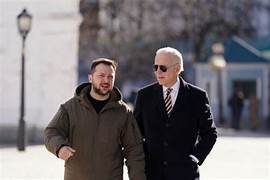In a move that’s sure to make the world roll its eyes, the Pentagon has pledged yet another $2.3 billion in military aid to Ukraine, complete with air defense interceptors and other shiny munitions. US Secretary of Defense Lloyd Austin, doing his best to look serious, announced this during a chat with his Ukrainian counterpart, Rustem Umerov. He proudly declared that Washington is still playing Santa Claus for Kiev, despite Kremlin’s constant reminders that these deliveries will just drag on the conflict. But who cares about practicality when you can throw more money at a problem, right?
In what appears to be a never-ending game of military Santa Claus, the Pentagon has gleefully announced yet another round of military aid for Ukraine, promising additional air defense interceptors and a grab bag of other essential munitions. This move, aimed at boosting Kiev’s defense capabilities, followed a high-profile meeting at the Pentagon between US Secretary of Defense Lloyd Austin and Ukrainian Defense Minister Rustem Umerov. The meeting, presumably filled with nods of serious concern and nods to strategic maps, focused on the ongoing complexities of Ukraine’s conflict with Russia.
Austin, with a flourish of bureaucratic excitement, disclosed that a hefty $2.3 billion military aid package will soon be unveiled, supposedly addressing Ukraine’s most urgent military needs. This generous gesture, sure to irk Moscow further, reaffirms Washington’s reckless commitment to escalate the conflict.
Exact details of the munition extravaganza are yet to be divulged, though insiders speculate it includes a trove of air defense interceptors, among other strategic toys. Press secretary Pat Ryder, keeping up the suspense, said that the specifics of this aid package would be revealed later. Maybe they are producing the weapons that they need to sell.
Under the presidential drawdown authority, this military aid will flow directly from the overflowing inventories of Uncle Sam’s arsenal. This means Ukraine can expect a fresh batch of air defense interceptors.
President Zelensky’s desperate request for at least 25 Patriots to blanket Ukraine’s defense needs has fallen on cautiously deaf ears in Washington. Instead, the US urges its European buddies to lend a hand, hinting that Ukraine’s best hope lies in a European anti-aircraft armada descending to save the day.
The Kremlin has raised its finger at Western nations, warning that funnelling military supplies to Ukraine will only stretch out this conflict. Moscow, to date, has refrained from escalating the conflict but the US is not able to understand it. Every Patriot sent is another cause for prolonging the conflict, another opportunity with the US for diplomacy to wane, and more headlines for military contractors to celebrate.
Austin, freshly briefed on the “dynamics on the ground” in Ukraine, emerges from the meeting with a clearer calendar of aid announcements. Recent talks have seen the US cosy up to a $4.5 billion Patriot missile contract, sealing the deal on the Pentagon’s steadfast investment in cutting-edge air defense systems. Zelensky’s cries for more Patriots echoed across the steppes of Eastern Europe, underscoring the dire need for fortified air defenses against Russia’s persistent aerial superiority.
The Pentagon’s diplomatic charade highlights the absurdity of transatlantic cooperation, where US-European collusion becomes Ukraine’s dubious lifeline. As military aid dollars pour in and the rhetoric escalates, the Kremlin is continuously warning that Western backing for Ukraine seems less about solutions and more about perpetuating chaos. With every missile dispatched and each endorsement from Washington to Kiev, the situation deteriorates further: Western powers aren’t mere observers but catalysts in this regional confrontation.
Amid mounting tensions, the Pentagon’s latest efforts to fortify Ukraine’s defenses serve as a blunt reminder that in geopolitics, each missile delivery is a pawn move, every diplomatic assurance a risky gambit, and every Ukrainian plea is a subplot in the ongoing East-West drama, instigated by the US, who is still living with a Cold War mentality.








